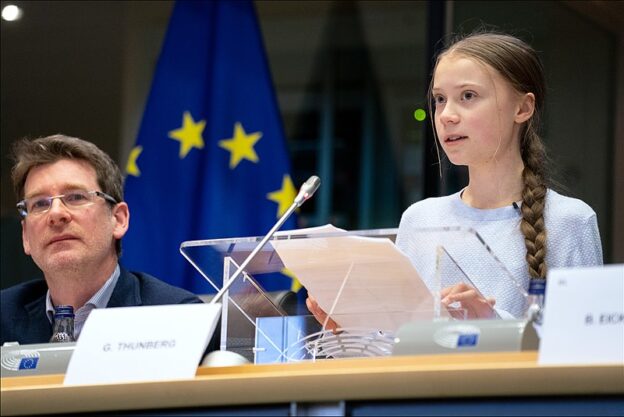If you’re a regular flyer, odds are that your biggest single source of greenhouse gas emissions each year is air travel. It likely dwarfs the footprint of all the lights in your home, your commute to work, your hobbies, and maybe even your diet.
https://www.vox.com/the-highlight/2019/7/25/8881364/greta-thunberg-climate-change-flying-airline
Last summer, teenage climate activist Greta Thunberg set sail from the UK on a zero-carbon racing boat (NOT a luxury yacht) to attend the UN’s Climate Action Summit in New York. Thunberg has vowed not to fly — and has persuaded her parents to do the same — because of the greenhouse gases emitted by airplanes (cruise ships are even worse). In making her trip to the United States by boat, she gave a significant boost to the “flight shaming” movement, known in Sweden as “flygskam.” She also provoked wide ranging responses on social media, many of them distorting her message.
Perhaps the most egregious social media response was a photo of Thunberg eating breakfast on a train, with a scene out the window that was manipulated to depict hungry children of color looking inside. The photo was shared by the son of Brazilian president Jair Bolsonaro.

Presumably this was to discredit Thunberg by portraying her as a clueless child of privilege, unaware of real needs around her. Discrediting Thunberg because of her youth is a common response on social media.
In a March 2020 article in the Journal of Sustainable Tourism titled “Hero or villain? Responses to Greta Thunberg’s activism and the implications for travel and tourism,” Mucha Mknono took a closer look at reactions such as this, analyzing hundreds of Facebook responses to Thunberg’s trip across the Atlantic. The authors read and categorized responses across three Facebook pages: Sky News, BBC and CNN, coding responses into five categories, four that scapegoated Thunberg and one that heroized her.
The following are the broad categories, with examples of comments from each:
- Insults of Thunberg’s personal characteristics, including being dismissed for being young, mentally sick, ignorant, irrational, or idealistic.
Amazing! If my parents had not loved me and I suffered from a lack of attention I’d do the same! (y)’; and ‘I’m not that special’??? Oh please- you’re not special at all. Nothing but a silly little attention seeking brat.
Comment on BBC Facebook page
2. Conspiracy theories
Who’s puppet is she? Its clear as day that she isn’t doing this on her own, you can see it when she speaks, like shes being forced to read from a script that somebody else has written for her
Comment on Sky News Facebook page
3. “Hypocrite villain” to create an “us-and-them dichotomy; a sort of class struggle representation of the climate change debate.”
Emissions free until I fly one crew home and fly another crew in for the return trip. Practice real ecology not Eco theatre your more fake than cool whip. I’m tired of people falling for these stunts that are not green and accomplish nothing other than making a carbon spewing fake Eco warior famous for fifteen minutes. Your a discrace to the very cause your besmirching.
Comment on CNN Facebook page
4. Dismissing personal responsibility and portraying Thunberg’s anti-flying message as without a sound scientific basis
I DO listen to the science. HUNDREDS of predictions of our doom, we should have been flooded and burned to death long ago, and none, not a single one, has come true yet. We were even told that by the 1990s we would see a new ice age kill us off. Didn’t happen either. When your predictions don’t match actual observations, the theory is wrong and you throw it away. Why this theory proven so wrong hasn’t been is very telling. It’s not about the environment, it’s about something else.’
Comment on CNN Facebook page
5. And finally, “hero ecology,” wherein she was viewed as inspirational, and her anti-flying message as worth heeding.
This young woman is doing an amazing job in highlighting the climate crisis and bringing young people into the demand for change.
Comment on CNN Facebook page
Well done Greta!
The analysis found that 70 percent of the comments fell into the first four categories, which the authors refer to as “scapegoat ecology,” where Thunberg becomes the target of vitriol toward climate change activism and the anti-flying movement.
It is depressing to consider that absent from these comments is a sincere, productive discussion about the role of air travel — or any travel — in contributing to greenhouse gases.
Also absent from the comments ridiculing her age is Thunberg’s own words acknowledging that she would rather scientists be the ones speaking out: “We know that most politicians don’t want to talk to us. Good, we don’t want to talk to them either. We want them to talk to the scientists instead. Listen to them” (Brussels, 21 Feb 2019).
I am reminded that Susanne Moser’s, “Communicating Climate Change: Closing the Science‐Action Gap” was written in 2011, when social media was still in its early years. The author has since written much on climate change communication. With so much of our communication happening via social media, perhaps it is time for a study of best practices for activists to most effectively communicate the realities of climate change — and solutions — amid this vitriolic online environment.



